Sibling Synergy: The Three Cohens

The Three Cohens participate in Berklee Marsalis Jams in April 2011.
Photo by Kelly Davidson
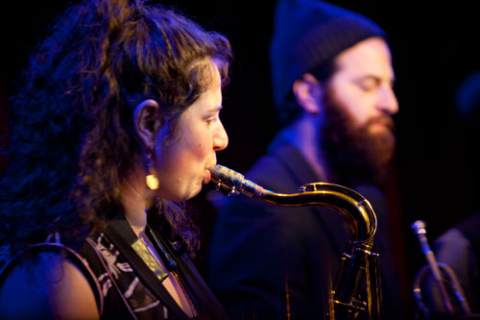
Anat and Avishai Cohen
Photo by Kelly Davidson
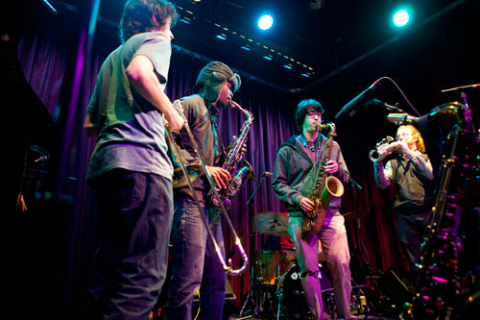
Students jam with the Three Cohens.
Photo by Kelly Davidson
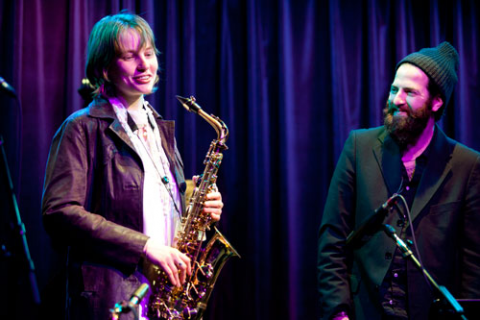
Student Sagit Zilberman and Avishai Cohen
Photo by Kelly Davidson

Student Lihi Haruvi
Photo by Kelly Davidson
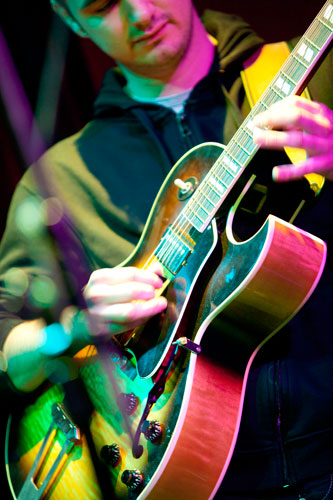
Sergey Chashkin
Photo by Kelly Davidson
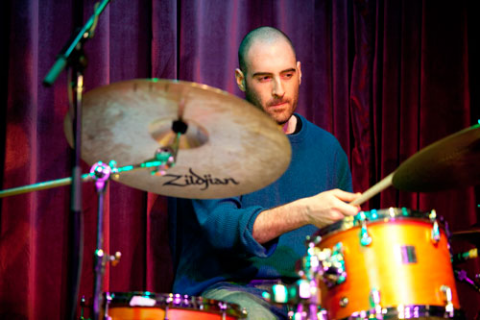
Basil Al Bader
Photo by Kelly Davidson
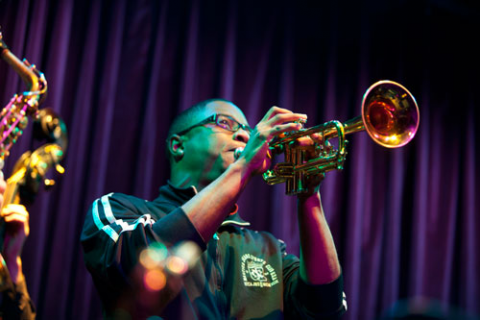
Jason Hunter
Photo by Kelly Davidson
They shared professors, classrooms, and like other Berklee students, an affinity for the corner of Mass. Ave. and Boylston Street. But until recently, the Three Cohens—Yuval '97, Anat '98, and Avishai '00—never shared a Berklee stage at the same time. The multi-instrumentalist alumni siblings have performed around the world together, and for the first time this April, returned as a band to their alma mater for the seventh installment of Berklee Marsalis Jams, which brings jazz artists to perform with Berklee students, as well as host master classes and clinics.
The Three Cohens—hailed by critics for their onstage synergy—displayed similar unity when they played with students; they finished each other's sentences while critiquing their performances.
It's no surprise for siblings with such a similar musical education track: While growing up in Tel Aviv, they attended the same day school and conservatory, and later were awarded scholarships to Berklee, where they further cultivated their love for jazz.
The opportunity to collaborate with the trio and their band was not lost on the students who participated in Berklee Marsalis Jams.
"We're extremely privileged to be able to interact with and get input from these incredible musicians," said voice principal Jeanette Gort, who performed "How High the Moon."
The following is an excerpt of a conversation with the Three Cohens before a jam session.
What did it feel like to be back on your own familiar ground?
Anat: It's like the same if you ask what it's like to be playing in Israel together. It just feels familiar, very much like home. It feels like a family. And seeing some of the teachers we learned so much from still being around here, and dedicated to what they're doing, is incredible. It feels very natural in a way because of all the students here. It's amazing to be back here, to play for the students. We got a lot from Berklee. It's great to be able to give back something. It's great to be able to teach.
Yuval: I mentioned to Ken Pullig that students [now] are very fortunate to have the same teachers teaching with the same passion. It was 15 years ago and I saw Ken Pullig yesterday conducting the same ensemble that I used to be playing in and I see the same the same energy and the same gestures. It's very admirable. It's not easy. Teaching is a difficult role and to see him doing it with the same passion year after year is really admirable.
What teachers were particularly influential to you?
Avishai: We just had a breakfast this morning with [president] Roger Brown and [professor] Phil Wilson. They asked the same thing and we all mentioned Phil Wilson, Ken Pullig, Greg Hopkins, Hal Crook, Ed Tomassi, and for me Tiger Okoshi. Also, George Garzone and Bill Pierce.
Yuval: I'd also like to mention three teachers who have passed: John LaPorta, Herb Pomeroy, and Joe Viola.
Did you all have a similar trajectory here?
Anat: In a way, yes, because we all focused mainly on playing or performance. Even if wasn't the actual major we graduated in, performance was the main reason we all came here. We wanted to play. So we took classes with people who are involved in harmony and performance and improvisation. Also, Yuval came here first and he recommended people to me and I recommended people to Avishai. For a brief moment, the three of us were here at the same time.
Avishai: [Anat and Yuval] lived together. I came here for a couple of months and they were living together. Yuval left and I took his room.
What's it like to play together as siblings?
Avishai: it's the best thing in the world. It's easy. We are fortunate that we have the ability to communicate at a higher level than most musicians. Musicians can get very familiar with each other after years of playing together. Music is a nonverbal communication so you count on either looks or feelings or get to know each other from the music. Beyond the music, [musicians rely] on body gestures or a look or a smile, and for us, we need less and less gesture because we know what we mean.
What were some biggest lessons as musicians you got at Berklee that you use today in your playing?
Anat: The passion that those teachers have, when a teacher is always into what they're doing. . . that's the kind of enthusiasm they passed on to us, loving music, loving what we're doing, and always passion.
